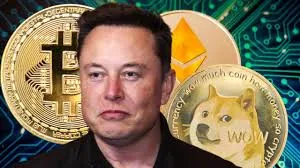DO YOU SUPPORT DOGE?
In recent years, the world of cryptocurrencies has grown significantly, with Bitcoin and Ethereum leading the way. However, a new cryptocurrency has caught the attention of the masses, not because of its technological innovations or serious market potential, but because of its whimsical nature and viral internet culture—Dogecoin. Originally created as a joke, Dogecoin has become a serious player in the crypto market. This article delves into the story of Dogecoin, its rise to fame, and whether it’s worth supporting as a cryptocurrency.
Dogecoin was launched in December 2013 by software engineers Billy Markus and Jackson Palmer as a parody of the cryptocurrency boom. The coin’s image, a Shiba Inu dog from the popular “Doge” meme, was meant to poke fun at the world of digital currencies. Little did they know, Dogecoin would evolve into one of the most widely recognized digital currencies, driven not by the technology behind it, but by a community of enthusiastic supporters.

What makes Dogecoin unique compared to other cryptocurrencies is its fun and light-hearted approach to finance. Unlike Bitcoin or Ethereum, which focus on decentralization and blockchain technology as solutions to various financial problems, Dogecoin’s appeal has always been its simplicity and the meme-like culture surrounding it. Dogecoin’s value has been driven largely by social media and online communities, which have used the coin to tip content creators, fund charity events, and raise money for various causes. This sense of community and generosity has turned Dogecoin into a symbol of internet culture, rather than a serious investment tool.
Despite its humble beginnings, Dogecoin has gained significant traction in the market. Its market capitalization has fluctuated, at times reaching billions of dollars, thanks in large part to the support of high-profile individuals like Elon Musk, whose tweets about Dogecoin have caused the coin’s value to surge. While Musk’s support has been both a blessing and a curse for Dogecoin—bringing attention to the coin but also subjecting it to intense speculation—it is undeniable that Dogecoin has carved out a space for itself in the crowded cryptocurrency market.
One of the key selling points of Dogecoin is its low transaction fees and quick transaction times. This makes it an attractive option for microtransactions, such as tipping content creators or making small online purchases. Bitcoin, in comparison, has higher transaction fees and slower confirmation times, making it less suitable for everyday use. Dogecoin’s scalability has also made it a preferred choice for many who wish to avoid the congestion that often plagues other blockchain networks. Its inflationary supply model—where new coins are continuously mined without a cap—also contributes to its lower transaction costs.
However, Dogecoin is not without its criticisms. Many argue that Dogecoin lacks the technological innovation of other cryptocurrencies. While Bitcoin’s blockchain provides security and decentralization, Dogecoin’s blockchain has fewer features and lacks some of the advanced functionalities found in Ethereum or Cardano. The fact that Dogecoin’s supply is unlimited raises concerns about long-term value retention. Critics suggest that Dogecoin could eventually lose its appeal as the market becomes saturated with too many coins in circulation, diluting its value over time. 
Furthermore, the volatility of Dogecoin is a major concern for those who view cryptocurrencies as an investment. Dogecoin’s value is highly susceptible to market sentiment and social media trends. It is not uncommon for the price of Dogecoin to skyrocket one day only to plummet the next. This volatility makes Dogecoin a risky investment for those looking for stability. Despite this, many investors continue to buy into Dogecoin, driven by the hope that its popularity will continue to rise, propelled by the community and influencers.
In terms of adoption, Dogecoin has made significant strides, particularly within the world of online tipping and charitable donations. For example, in 2014, the Dogecoin community raised over $50,000 to sponsor the Jamaican bobsled team’s trip to the Winter Olympics. This event helped cement Dogecoin’s reputation as a fun and community-driven cryptocurrency. More recently, Dogecoin has been used to support charitable causes, such as funding clean water initiatives in developing countries. These acts of kindness and generosity have helped endear Dogecoin to a broad base of supporters.
The question of whether or not one should support Dogecoin ultimately depends on the individual’s goals. For those looking for a serious investment with long-term potential, Dogecoin may not be the best choice. It is highly volatile and lacks many of the technological advancements of other cryptocurrencies. However, for those who enjoy the community-driven, meme-inspired culture of Dogecoin, supporting the coin can feel like being part of a fun, decentralized movement. Dogecoin embodies the spirit of the internet—informal, quirky, and unpredictable. 
In conclusion, whether you support Dogecoin or not is a personal choice that depends on your perspective toward cryptocurrencies. While it may not have the technological depth of other coins, its appeal lies in its lighthearted nature and the sense of community that surrounds it. Whether you see Dogecoin as a serious investment, a fun social experiment, or simply a way to participate in a global online community, it remains a significant player in the cryptocurrency world. As the market continues to evolve, only time will tell if Dogecoin’s value will continue to rise or if it will fade into internet history.






